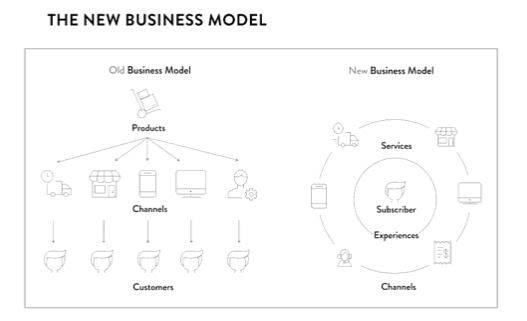Aug 21, 2018
Why Your Next Purchase Will Be a Subscription Service
Look at your credit card bill? How many of those charges did you actually physically use a card for? Most are probably recurring charges for subscriptions services like Netflix, Spotify, or Uber. As a nation, we’re renting more and owning less.
Welcome to the subscription economy. You’ve actually been living here a while. What seemed like an extreme idea a decade ago has now become the business model de jour. Instead of buying cars, DVDs, and software, we now rent them for a short time.
When Zuroa founder and keynote speaker Tien Tzuo proposed the idea of a subscription economy people thought he was crazy, he was smoking something funny, and his ideas were out-of-step with reality.
But, ask yourself, when was the last time you bought a new CD? Now companies like GE and IBM, stalwarts of the Fortune 500, no longer talk about being product companies. Instead of selling light bulbs and software, they sell digital solutions. Apple no longer puts its emphasis on iPhones but sees the next area of growth in streaming services and recurring revenue.
This is the new model for business. In his national bestselling book Subscribed: Why the Subscription Model Will Be Your Company’s Future-and What to Do About It, Tzuo outlines how the subscription model will benefit consumers and businesses alike.

Less risk in trying new products
With a subscription service, a customer is no longer committed to owning a product. So when the latest Nicki Minaj album comes out, you don’t have to be stuck with a bunch of songs you don’t like. With a subscription service like Spotify, you can try the album out and if it isn’t any good, you can always listen to Taylor Swift.
And for small businesses, it allows them an opportunity for people to try their product without fear, giving them a chance to expand their customer base. Tzuo points to a small arts and crafts company that uses a subscription service to get customers to try their products and has built a strong following from it.
No more obsolescence
For consumers, there is no more worry of buying a tech product, only to have it become useless after a year or two. For years, people had to pay for each new Microsoft Office or operating system software update. Now, many software companies offer subscriptions with constant updates.
For example, Adobe has a subscription service for its Creative Cloud suite of video, image, and design software. This subscription helps pay for software development costs and also keeps a loyal and committed fan base by providing the latest updates.
Customer-centric service
In the old business model, companies were focused on products and their own needs. But with a subscription model, it puts the focus squarely on the customer. Consumers benefit by getting value and new options created for them all the time. Take Amazon Prime, for example: it is always adding new films, music, and books for subscribers to try out. Or companies that make apps for smartphones: these apps are constantly updated with new features.
For companies, a customer focus saves money and time by only focusing on those products and services their customers really want. A good example of this is when Fender decided to focus on their customer base. It created tuner apps and music lessons to help users learn to play Fender guitars, thereby changing new guitar buyers into long-term customers.
For customers and businesses, this subscription model will bring an amazing future of products and services that will stay relevant. While this model will change everything you’ve become accustomed to, there’s no need to be afraid of it—you can try out it for little risk, and if you don’t like it, you can stop anytime.
Kyle Crocco is the Content Marketing Coordinator at BigSpeak Speakers Bureau, a graduate of UC Santa Barbara, and the lead singer of Duh Professors. He regularly publishes business book reviews and thought articles on Medium, Business 2 Community, and Born 2 Invest.
Speaker
Tags

 Tien Tzuo
Tien Tzuo